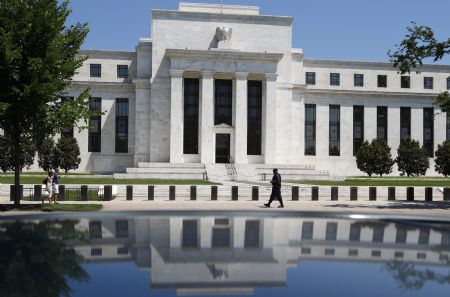|
 |
|
The U.S. Federal Reserve is reflected in a car as a security officer patrols the front of the building in Washington, June 24, 2009. (Xinhua/Reuters File Photo) |
The U.S. Federal Reserved on Wednesday decided to leave a key interest rate at a record low in an obvious effort to foster a nascent economy recovery.
Wrapping a two-day meeting, the Federal Open Market Committee (FOMC) said in a statement that it will maintain the target range for the federal funds rate at 0 to 0.25 percent, indicating that it will leave the benchmark interest rate at exceptional low levels "for an extended period" of time.
"Information received since the Federal Open Market Committee met in August suggests that economic activity has picked up following its severe downturn. Conditions in financial markets have improved further, and activity in the housing sector has increased," FOMC said.
The committee expressed concerns that while household spending seems to be stabilizing, it remains constrained by ongoing job losses, sluggish income growth, lower housing wealth, and tight credit.
"Businesses are still cutting back on fixed investment and staffing, though at a slower pace; they continue to make progress in bringing inventory stocks into better alignment with sales," it added.
The committee said that it expects inflation will remain subdued for some time because substantial resource slack is likely continue to dampen cost pressures and longer-term inflation expectations remain stable.
"In these circumstances, the Federal Reserve will continue to employ a wide range of tools to promote economic recovery and to preserve price stability," FOMC said in the statement.
The Fed on Wednesday also decided to slow down the pace of a program designed to aid housing purchases amid signs that the battered housing market is stabilizing.
"To provide support to mortgage lending and housing markets and to improve overall conditions in private credit markets, the Federal Reserve will purchase a total of 1.25 trillion U.S. dollars of agency mortgage-backed securities and up to 200 billion dollars of agency debt," FOMC said.
"The Committee will gradually slow the pace of these purchases in order to promote a smooth transition in markets and anticipates that they will be executed by the end of the first quarter of 2010," it added.
The Federal Reserve announced the program to buy mortgages and debts from Fannie Mae, Freddie Mac and Ginnie Mae last November, shortly after the financial crisis culminated with the collapses of the Lehman Brothers.
The program, designed to prevent a complete breakdown of the housing market, was originally scheduled to end by the end of this year.
Observers believe that the Fed decision to stretch out the goal of purchasing 1.45 trillion dollars in mortgage-backed securities and debt issued by companies like Fannie Mae and Freddie Mac shows that the U.S. central bank is confident the nascent recovery will take hold.
The Federal Reserve has so far bought about 775 billion dollars worth of mortgage-backed securities and debt from the major loan providers for home buyers.
The stock markets responded to the Fed decision and statement in a very dramatic way. Stocks, which were little changed in early trading on Wednesday, first jumped by around 50 points in the immediate announcement of the Fed decision but quickly turned negative in later trading.
(Xinhua News Agency September 24, 2009) | 